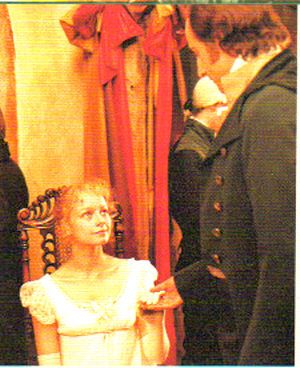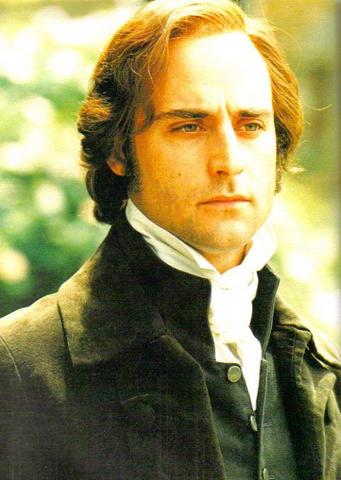Ellen and Jim Have a Blog, Too
We are two part-time academics. Ellen teaches in the English department and Jim in the IT program at George Mason University.


Austen make-overs: the other Mr Knightley · 23 November 06
Dear Harriet,
I’m doing this journal-style now: I went for 1996 BBC Emma last night (for the 1996 Meridian A&E, see Film traditions and pictures).
11/23, 1 in the morning: I just watched the 1996 BBC Emma (Birtwistle and Lawrence, starring Kate Beckinsale and Mark Strong, as Emma and Mr Knightley, with Samantha Morton as a nervous perceptive Harriet and Raymond Coulthard a caddish shallow Frank Churchill). I delighted in the happiness at the end, and enjoyed the intensities of other scenes; the Miss Bates scene was slowly worked up to, and the screenplay in general better than McGrath’s (less repetition and more content, including more from Austen, though McGrath has the scenes of poverty and Emma at her writing table with Paltrow doing over-voice), and if it ended not as painful it’s that Beckinsale herself does not carry off sly spite as well as Paltrow does. Samantha Morton is the more charismatic and subtly emotional actress and dominated the emotional currents of the scenes she appeared in; this was strongly apparent in scenes with Kate Beckinsale as Emma (Harriet’s betrayer really), but I have no stills of this, only the one of Mark Strong (Mr Knightley) proferring his hand to the painfully snubbed Harriet Smith:
This time I became aware that Strong plays Mr Knightley too scornfully: he seems ever on the edge, and ever "displeased" and angry with Emma, yet the production did not see the parallel between Mr Martin’s "superiority" to Miss Smith and Mr Knightley’s to Emma. (The problem here in the novel too is what are the grounds for this? and where do these standards come from, given the lack of education and serious work tasks given the women.) Perhaps Beckinsale’s lackluster performance might be due to her not liking continually to be scolded and have to look yearningly at the austere sexually intense "master" Strong embodied (he played the torturer in Syriana). This is a production whose subtitle might be called "the justifiable humiliation of that dangerously indulged Miss Woodhouse."
In the publicity still Strong’s more emotional and vulnerable side is to the fore. But there’s a hard on-guardedness and disdain, a sternness glimpsed even here. Tellingly about the costuming of the productions in the last 10 years, we see that the way he’s dressed (not super-rich, super-elegant, and slightly disheveled) anticipates the way Donald Sutherland is dressed:
I fancy from gazing at this still, Mark Strong is more fitted to play Mr Darcy as described by Austen herself than any of the male actors chosen thus far, e.g.,
"In understanding Darcy was the superior. Bingley was by no means deficient, but Darcy was clever. He was at the same time haughty, reserved, fastidious, and his manners, though well bred, were not inviting" (P&P, Chapter 4).
In this commentary on the BBC Emma I manifest some of the problems of staying with this discourse of fidelity. You end up seeing see how close here, and how far away there, and are at risk of producing a discourse whose main general social function can be to keep up the fetishicizing of high status texts (no matter how good the particular one the stance makes literary study into a way of upholding an entrenched establishment). It becomes a kind of subjective game, and nothing is "recuperated" (as those who see themselves as defending Austen’s text justify themselves).
Sylvia
--
Posted by: Ellen
* * *
Comment
commenting closed for this article


